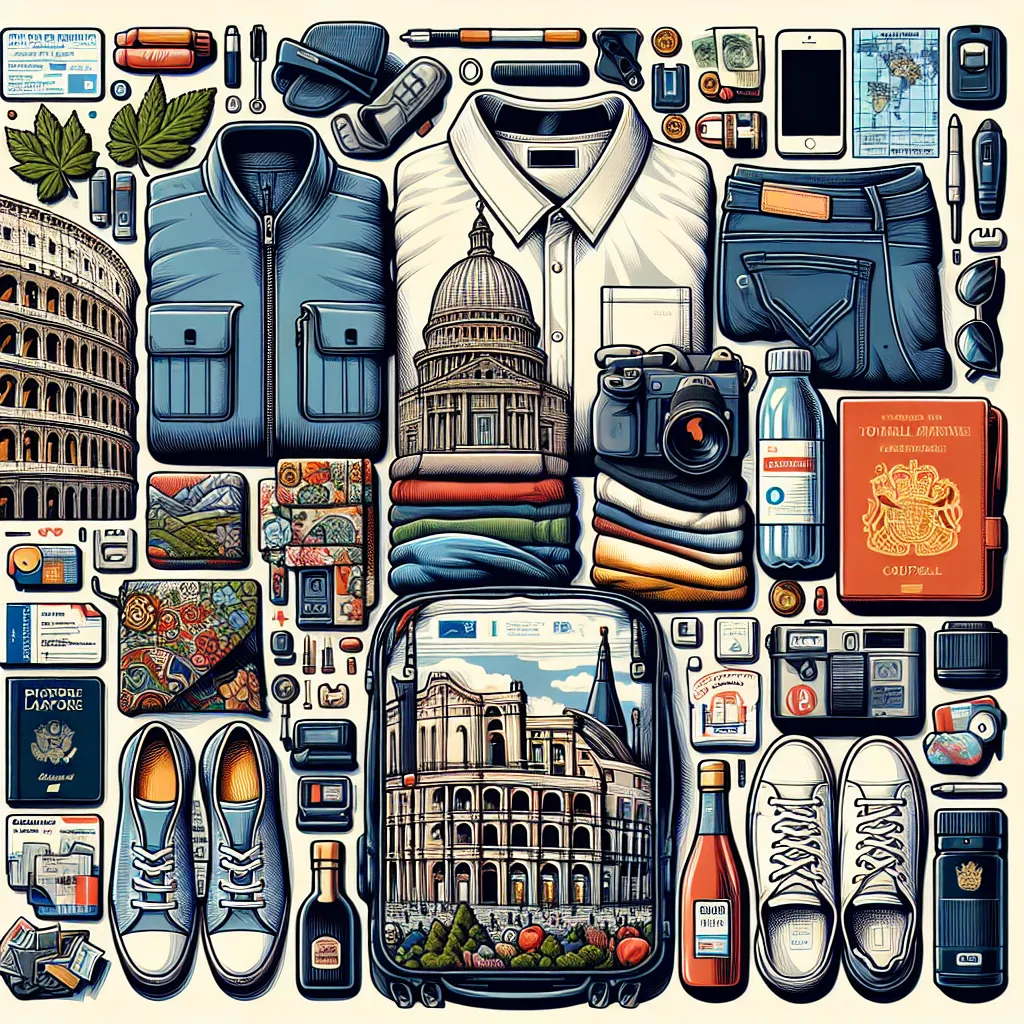Planning a 21-day trip to Europe can be an exciting yet daunting task. With so many countries to explore and cultures to experience, preparation is key.
This comprehensive guide aims to simplify your planning process. It provides a detailed checklist to ensure you're well-prepared for your European adventure.
From understanding the diverse European climates to packing smart, we've got you covered. We'll delve into essential travel documents, money management, and even leisure activities for your downtime.
We'll also discuss health, safety, and hygiene considerations. Plus, we'll share tips on organizing your luggage efficiently.
Whether you're a seasoned traveler or embarking on your first European journey, this checklist is designed to help you. So, let's get started on your packing list for a memorable 21-day trip to Europe.
Understanding the European Climate and Culture
Researching Europe's climate and cultural norms is crucial for a successful journey. This preparation ensures you're dressed appropriately and respectfully throughout your travels.
Each European country boasts its own unique climate, which can drastically change your packing list. Understanding these variations helps you stay comfortable and prepared.
European Climate Variations by Region
- Northern Europe: Cool and often rainy, especially in countries like Norway and Sweden.
- Western Europe: Mild weather in areas such as the UK and Ireland.
- Southern Europe: Mediterranean climate, warm in places like Italy and Spain.
- Central Europe: Moderate climate with four distinct seasons in countries like Germany and Austria.
- Eastern Europe: Cold winters and warm summers in countries like Poland and Russia.
Respecting cultural differences in Europe is equally important. Some regions may prefer modest clothing styles, especially when visiting religious sites or rural areas.
Consider layering your outfits for versatility and comfort, as this allows you to adapt to both climate changes and cultural expectations. By doing so, you ensure not only your comfort but also show respect towards local customs.
Essential Travel Documents and Money Management
Having the right travel documents is vital for a smooth trip. Ensure you have valid passports, visas, and any necessary permits well before departure.
Make photocopies of these documents as a backup. Store physical copies separately from the originals for added security.
Financial Preparations
- Notify banks of your travel dates to prevent card issues.
- Research currency exchange rates and plan accordingly.
- Consider travel credit cards with minimal foreign transaction fees.
- Set a daily spending budget to manage expenses.
Handling money wisely can prevent unwelcome surprises. Use a money belt or hidden pouch to keep your cash and cards secure.
Avoid carrying large amounts of cash. Use a combination of credit cards and small amounts of local currency for purchases.
Stay aware of your surroundings when handling money. Being cautious protects you from potential scams or theft, ensuring a worry-free experience.
Clothing and Footwear: Packing Smart and Light
A successful 21-day trip to Europe requires smart clothing choices. Opt for versatile pieces to mix and match easily. Select items that can transition seamlessly from day to night.
Think about fabric types that resist wrinkling and are quick to dry. Clothing that serves multiple functions saves space and weight in your suitcase.
Checklist of Essential Clothing Items
- Two pairs of jeans or trousers.
- Three to four shirts or blouses.
- Two lightweight sweaters or cardigans.
- One versatile dress or skirt.
- A compact windbreaker or jacket.
- Underwear and socks for a week (plan to wash).
Footwear is crucial for comfort during long days of exploration. Choose shoes that are breathable, supportive, and suitable for various terrains.
Break in new footwear before your trip to prevent blisters and discomfort. A pair of casual walking shoes and one dressier option should suffice.
Special Occasion and Weather-Appropriate Clothing
- A lightweight scarf or shawl for warmth or style.
- Waterproof shoes or boots for rainy destinations.
- A pair of sandals for warmer climates.
- An evening outfit for formal events or dining.
- A compact swimsuit for beach visits or hotel pools.
Packing smart means anticipating different weather conditions and cultural settings. By packing light and effectively, you focus more on enjoying your travels rather than managing luggage. Adaptability is key, ensuring you're ready for any adventure Europe offers.
Electronics, Adapters, and Connectivity
Traveling to Europe means navigating different power outlets. Bringing the right adapters and converters is crucial. Without them, you might find yourself unable to charge your devices.
Ensure you have universal adapters suitable for the specific countries you'll visit. It's a small investment that saves hassle and keeps your devices powered.
List of Essential Electronics
- Smartphone and charger
- Digital camera with extra memory cards
- Portable charger or power bank
- E-reader or tablet
- Noise-canceling headphones
- Travel-friendly laptop (optional)
Staying connected is vital, whether for checking maps or keeping in touch. Consider buying a local SIM card for data and calls. This can be more affordable than using international roaming on your existing plan.
Alternatively, rely on Wi-Fi hotspots available in cafes and hotels. Manage settings to use Wi-Fi for most online activities to save on data costs. Staying prepared ensures you’re always connected to your European adventures.
Health, Safety, and Hygiene
Travel health preparedness is essential. A travel-sized first-aid kit is a smart move for any long trip. It’s always better to have it and not need it than the reverse.
Your first-aid kit should include basics like band-aids, antiseptic wipes, and pain relievers. Tailor it to your needs, considering any personal health conditions.
List of Personal Hygiene Products to Pack
- Toothbrush and toothpaste
- Travel-sized shampoo and conditioner
- Body wash or soap
- Deodorant
- Razor and shaving cream
- Feminine hygiene products
- Nail clipper
- Hairbrush or comb
- Sunblock and moisturizer
Consider health and safety before traveling to Europe. Check for required vaccinations well in advance. Some may need time to take full effect.
Purchase travel insurance to cover unexpected medical issues or emergencies. Ensure your plan includes coverage for COVID-19-related concerns. Pack wisely to protect your health and stay safe on your journey. Staying prepared lets you focus on enjoying your travel adventure without worry.
Organizing Your Luggage: Packing Aids and Techniques
Efficient packing can transform your travel experience. Packing cubes and organizers can help you arrange belongings neatly. They simplify finding items without unsettling everything in your suitcase.
Such organizers aid in categorizing clothes, making unpacking at each destination effortless. They also help prevent clothing from getting wrinkled during transit.
List of Packing Aids
- Compression bags for saving space
- Multi-use items like sarongs
- Ziploc bags for liquids
- Shoe bags to separate footwear
- Reusable laundry bag
- Cable and gadget organizers
Maximizing luggage space requires skill and technique. Roll your clothes to optimize space and reduce creases. Utilize the space within shoes for packing smaller items like socks or chargers. These strategies ensure you have room for essentials, while keeping your luggage manageable. Packing smart lets you bring your necessary items without exceeding luggage limits or sacrificing convenience.
Leisure and Entertainment: Staying Engaged During Downtime
Traveling offers abundant opportunities for leisure and reflection. Bringing entertainment ensures you stay engaged, especially during long journeys. Consider packing lightweight items to keep you entertained.
Suggestions for Travel Entertainment
- E-reader with favorite books
- Travel-sized board games
- Music playlists on your phone
- Downloaded podcasts or audiobooks
- Sketchbook and pencils for creative expression
Documenting your trip helps preserve memories. A travel journal can capture daily experiences and reflections. Alternatively, starting a blog allows you to share stories and photos with friends and family in real-time.
Both methods help you remember details that might otherwise fade. Plus, they offer valuable insights into your journey when revisiting them later. Taking time to write or share experiences can enrich your travel, making each day more memorable and rewarding.
Final Preparations: Last-Minute Checks and Tips
As your departure date nears, reviewing your packing and preparations is crucial. A final checklist ensures nothing is forgotten. Confirm that your travel documents, clothes, and essentials are all in place.
Checklist for Final Review
- Ensure passports and visas are packed
- Double-check accommodation and transport bookings
- Pack chargers, adapters, and electronics
- Confirm travel itinerary details
- Secure money and valuables in a safe manner
Booking accommodations and transport in advance is wise. It guarantees availability and can save you money. Verify your reservations a few days before departure, and keep confirmation details handy.
Pre-planning also reduces travel stress. Knowing where you'll sleep and how you'll get around frees up energy for enjoying your adventure. Consider early bird discounts and other offers when booking.
For a smooth departure, know the airport's location and travel time there. Arrive at least two hours before your flight. Ensure your luggage meets airline size and weight restrictions to avoid surprises. Packing a small carry-on with essentials, like a toothbrush and spare clothes, is always a good idea in case of delays.
Conclusion: Ready for Your European Adventure
Embarking on a 21-day trip to Europe is exciting. With your comprehensive checklist in hand, you're well-prepared to enjoy the journey. Embrace each moment with an open heart and a spirit of adventure.
A well-prepared mindset enhances every travel experience. From cultural sites to culinary delights, your careful planning allows you to dive deep. Savor the freedom that comes with having a solid plan, leaving room for spontaneous explorations.
However, being flexible is just as crucial. Travel plans can change, and sometimes the best experiences are unplanned. Stay adaptable, ready to seize unforeseen opportunities, and make lasting memories along the way. Enjoy your European adventure!



